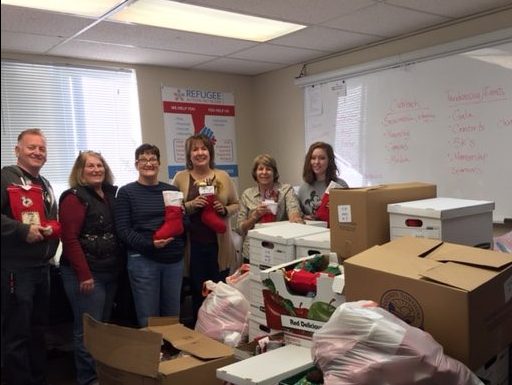
The Provo-based Refugee Action Network recently began providing unique ways for college students to serve refugees.
The LDS Church promoted the “I Was a Stranger” initiative in April 2016, which encourages members to find ways to serve refugees. Many students haven’t been able to find opportunities to act, according to Refugee Action Network’s founder, John Purnell.
“Everybody has to be feeling the same thing right now, which is, ‘How can we be engaged in this?'” Purnell said. “The question came up time and time again: ‘What’s being done in Provo?’”
And the answer was, “Not much,” according to the founder.
Purnell said the organization was formed in direct response to the April 2016 General Conference announcement to get involved with serving refugees. As with any starter business, the organization has been working for many months to set up its network and systems and is now fully up and running, with numerous opportunities for students in the area to serve refugees.
“If you think about all the students we have, we have two major universities here with tens of thousands of students who really want to help,” Purnell said.
Purnell explained how students can tutor refugees, mentor, teach life skills and transport, among other opportunities.
“They can take the family on a picnic or a hike, show them the area,” Purnell said.
James Ayuen is one of the refugees the Refugee Action Network is working with. Ayuen immigrated from South Sudan to the U.S. several years ago and initially went through a three-month government refugee integration program.
“People brought me here and said, ‘James, we’ll help you, provide a home for you, and food, for three months. Then after three months, you are on your way to figure out your life,'” Ayuen said. “This is not the case with the Refugee Action Network.”
At the end of 2016, the Refugee Action Network was able to help Ayuen’s wife, Priscilla, and their young son legally immigrate into the U.S. to reunite as a family. Both Priscilla and her son lived their whole lives in South Sudan refugee camps comprised of tents.
“(Refugee Action Network) will do everything to help Priscilla adjust to the American system,” Ayuen said. “The Refugee Action Network says, ‘We have to figure out a way to help them and teach, so that they become regular people in the community.”
One of the best ways BYU students can serve refugees like the Ayuen family is through teaching English, according to Purnell. Refugee Action Network holds daily English lessons for refugees in the Orem and Provo area.
According to the BYU Center for Language Studies, 77 percent of BYU students speak a foreign language. Purnell said refugees entering Utah could greatly benefit from the large group of bilingual students in the area.
According to Purnell, his organization can set up an individual student with weekly scheduled times to serve a refugee.
“If a student comes to us and says, ‘I have this time available every week,‘ then we can say, ‘Great, what is your skill set?‘ And we look at that and the needs of the refugees nearby,” Purnell said.
For students who want to get involved but don’t necessarily want to make a weekly commitment, the Refugee Action Network has several other one-time opportunities to serve.
One such example was a knitting night held in collaboration with BYU’s Y-Serve. Students and families gathered together on campus to knit hats and scarves to donate to refugees in need.
“I’ve always been very involved with refugees, because I’m Italian and there are refugees all about there,” said Chiara, a student who volunteered at the knitting night, and asked to be identified by only her first name. “I wanted to find a group that would provide material help for them. It makes me happy thinking as I’m making this hat that this is going to keep a kid warm.“

Another way students can serve refugees is by bringing donations to Refugee Action Network’s Provo headquarters. Purnell said some of the most rewarding instances he’s experienced with the organization so far are “having people show up at our door with donations.”
Students can find out more information about getting involved with the Refugee Action Network at the organization’s website.




